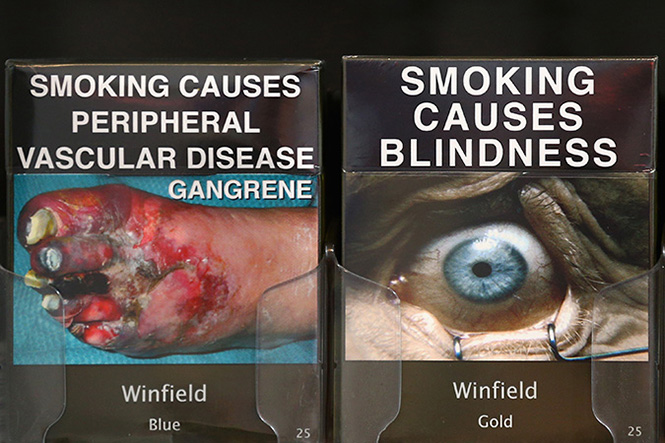What Happens When You Put Disturbing Labels on Cigarette Packs

By:
One of the things that keeps cigarette smokers smoking is the relationship they develop with tobacco brands.
 Curran Kelleher - flickr.com
Curran Kelleher - flickr.com
Take away the "cool," colorful packaging and, suddenly, people are less inclined to put toxic chemicals in their lungs, according to a recent study published in the journal Addictive Behaviors Reports. The study looked at rates of smoking in Australia before and after the country enacted a 2011 law that replaces branded cigarettes packaging with plain, graphic images depicting the dire health effects of tobacco addiction.
 Wikimedia - wikipedia.org
Wikimedia - wikipedia.org
In the 34 months before the packaging law took effect, 19.4 percent of Australians smoked. In the 34 months after the law was implemented, 17.2 percent smoked. "They also smoked less, made more attempts to quit, and increased their intentions of quitting," Quartz reported.
Two percentage points is statistically significant, lending credence to national cigarette packaging policies, researchers said. They theorized that the reason for the difference is that smokers tend to "identify not (just) as a smoker, but as a smoker of a particular brand."
The study concluded:
"Our results imply that, in addition to selling a product that causes death, tobacco companies also sell strong brand identities that help positively redefine what smoking means for a smoker's sense of self. The introduction of plain packaging was a rare opportunity to consider this thesis: since we can barely imagine what the world would be like without brands, we can easily underestimate their influence in shaping identity, perceptions and behavior. Plain packaging allows us to glimpse such a world, and to begin to understand the power of branding and brand identity in maintaining smoking behavior."
 Flickr / Kari Söderholm - flickr.com
Flickr / Kari Söderholm - flickr.com
The tobacco industry presumably anticipated this effect, as major cigarette companies like Phillip Morris have been waging legal wars against countries that attempt to do away with their products' packaging. Phillip Morris even filed an unsuccessful lawsuit challenging Australia's law in 2011, arguing that such policies violate intellectual property and trademark laws.
So far, the tobacco industry has been unable to prevent lawmakers from regulating the appearance of its addictive and deadly products. At least six countries — the U.K., France, Ireland, New Zealand, Uruguay, Hungary, and Canada — have laws requiring cigarette packs to be bland and include health warnings.
 Wikimedia - wikipedia.org
Wikimedia - wikipedia.org
That's bad news for the bottom lines of tobacco companies, but it's a win for public health. About 6 million people around the world die preventable deaths due to cigarette use each year, according to the World Health Organization.
